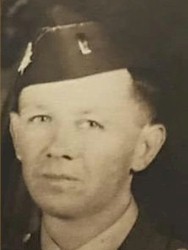Henry Wall was born Heinrich H. Wall, the son of a Mennonite Brethren couple in North Dakota. He was married in 1928 to Martha Regier at the Mennonite Brethren Church in Hillsboro, Kansas. He became a Southern Baptist and attended the Central Baptist Theological Seminary in Shawnee, Kansas, and was ordained as Baptist minister, beginning pastoral ministry in 1931. He also attended Oklahoma Baptist University in Shawnee, Oklahoma, in 1936. He pastored the Ponca City Baptist Church in Ponca City, Oklahoma, prior to enlisting in the U.S. Army as a chaplain during World War II. At that time he changed his name to Henry Wall, a less German-sounding name, and dropped his middle initial_thereafter he was known only as Reverend Henry Wall. After the war he moved to Stilwell, Oklahoma, to pastor the Stilwell First Baptist Church. He also served as pastor of First Baptist Church in Linwood and Lyons, Kansas, and Liberty Baptist Church in Ponca City, Oklahoma, and First Baptist Church, Moreland, Oklahoma. He retired to Shawnee, Oklahoma where he served as “pulpit supply” or interim pastor in 52 churches, most of them in the Pottawatomie/Lincoln Baptist Association.

–
Born:
,
Home:
,
Buried:
,
Cemetery:
Awards Received
-

Silver Star
-
Silver Star
Service:
United States ArmyRank:
Captain (Chaplain’s Corps)Regiment:
325th Glider Infantry RegimentDivision:
82d Airborne DivisionAction Date:
June 9, 1944
Headquarters, 82d Airborne Division, General Orders No. 34 (July 14, 1944)The President of the United States of America, authorized by Act of Congress July 9, 1918, takes pleasure in presenting the Silver Star to Captain (Chaplain’s Corps) Henry Wall (ASN: 0-436618), United States Army, for gallantry in action while serving with Headquarters, 325th Glider Infantry Regiment, 82d Airborne Division, in action against the enemy at Normandy, France, on 9 June 1944. Chaplain Wall aided in treating the wounded in a two-story house, the ground floor of which was quickly filled, but the second floor could not be utilized because the open windows exposed anyone there to enemy sniper and machinegun fire. Water was desperately needed in the aid station, but the only source of water on the farm was from a hand-pump located in the front of the house, in view and range of the German riflemen. Heedless of his own safety, Chaplain Wall to a five-gallon “jerry” can and went out to this pump, and returned with the much needed water. His gallant actions and dedicated devotion to duty, without regard for his own life, were in keeping with the highest traditions of military service and reflect great credit upon himself and the United States Army.

